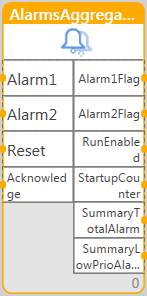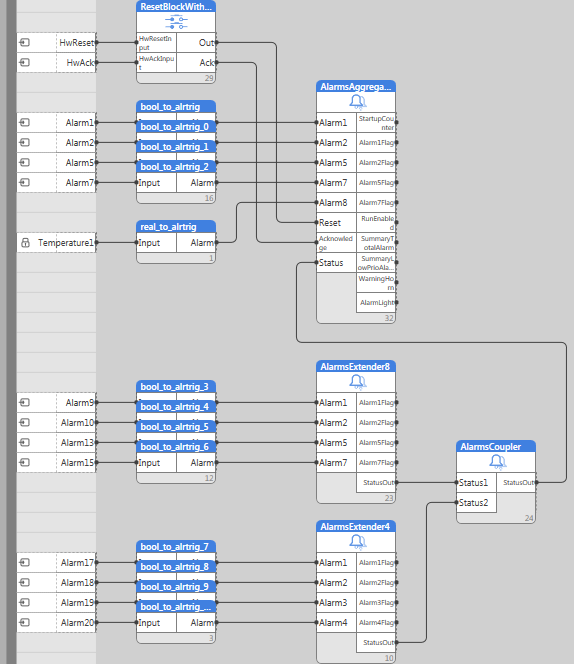Alarm Aggregator (v1.1)
Full Name
Lib.Mervis.v1_1.AlarmsAggregator
Required Project References
- Lib.Mervis
Description
[todo]
Usage in ST
program test
var
alr: lib.mervis.v1_1.AlarmsAggregator;
end_var
alr();
end_program
Usage in FUPLA
Used Alarm Priorities in Lib.Mervis
Assignment
| Priority | Class | Meaning |
|---|---|---|
| 0 to 15 | 0 | Total failure, results in blocking the operation enablement. |
| 16 to 31 | 1 | Total failure, results in blocking the operation enablement. |
| 32 to 47 | 2 | General failure. |
| 48 to 63 | 3 | General failure. |
Alarm Class is used to group multiple priorities into one category. This category is then used for reporting between different alarm blocks (AlarmsAggregator, AlarmsExtender, and AlarmsCoupler) using the AlarmsStatus structure.
If the priority is odd, it will automatically reset after it ceases.
For even classes, the corresponding alarm output (Alarm*Flag) remains active even in the remembered alarm state (i.e., Memory, AckedMemory). For odd classes, it is active only if the alarm itself is active (i.e., Active, ActiveAcked).
Inputs
| Name | Data Type | Retain | Mandatory to Connect | Meaning | |
| Alarm1 | AlarmTrigger | No | No | Alarm Input 1 | |
| Alarm2 | AlarmTrigger | No | No | Alarm Input 2 | |
| Alarm3 | AlarmTrigger | No | No | Alarm Input 3 | |
| Alarm4 | AlarmTrigger | No | No | Alarm Input 4 | |
| Alarm5 | AlarmTrigger | No | No | Alarm Input 5 | |
| Alarm6 | AlarmTrigger | No | No | Alarm Input 6 | |
| Alarm7 | AlarmTrigger | No | No | Alarm Input 7 | |
| Alarm8 | AlarmTrigger | No | No | Alarm Input 8 | |
| Reset | bool | No | No | Reset Alarms | |
| Acknowledge | bool | No | No | Acknowledge Alarms | |
| Enable | bool | No | No | External enable for subsequent technology (enables the output RunEnabled) | |
| Status | AlarmsStatus | No | No | Extended input for additional alarms | |
| StartupDelay | time | No | No | Startup delay after all alarms are reset | |
| HornActiveInLowPrio | bool | No | No | If true, the horn is active even when a low priority alarm occurs. This only works for alarms directly on the aggregator, not for extended blocks connected via Status |
Outputs
| Name | Data Type | Meaning | |
| Alarm1Flag | bool | Indication of non-reset alarm 1 (explanation see alarm priorities) | |
| Alarm2Flag | bool | Indication of non-reset alarm 2 | |
| Alarm3Flag | bool | Indication of non-reset alarm 3 | |
| Alarm4Flag | bool | Indication of non-reset alarm 4 | |
| Alarm5Flag | bool | Indication of non-reset alarm 5 | |
| Alarm6Flag | bool | Indication of non-reset alarm 6 | |
| Alarm7Flag | bool | Indication of non-reset alarm 7 | |
| Alarm8Flag | bool | Indication of non-reset alarm 8 | |
| RunEnabled | bool | Enable input for subsequent technology | |
| StartupCounter | time | Countdown of remaining time until enable input activation | |
| SummaryTotalAlarm | bool | Combined indication of high-priority alarm | |
| SummaryLowPrioAlarm | bool | Combined indication of low-priority alarm | |
| WarningHorn | bool | Output for horn control | |
| AlarmLight | bool | Output for fault light control | |
| StatusOut | AlarmsStatus | Output for connection to superior alarm blocks |
| Local Variables | Name | Data Type | Retain | Meaning |
| AlarmFlags | array[1..8] of AlarmPoint | Yes | States of individual alarms |
Detailed Function Description
[todo]

